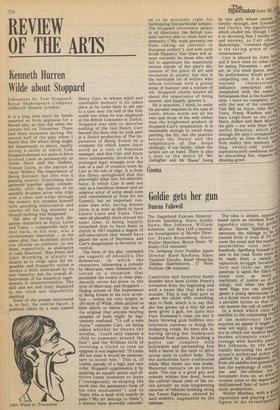Kenneth Hurren Wilde about Stoppard
Travesties by Tom Stoppard; Royal Shakespeare Company (Aldwych Theatre, London) It is a long time since my hands smarted so from applause for a flawed play as they did when the curtain fell on Travesties. There had been moments during the second half of the play when I feared that the whole thing might fall disastrously to pieces, mostly during a scene in which Tom Stoppard seemed not quite to have involved Lenin as persuasively as James Joyce and the Dadaist, Tristan Tzara, in the pattern of Oscar Wilde's The Importance of Being Earnest, but this was a passing anxiety. Everything was gathered together again consummately, after the fashion of an amiably drunken actor who trips over a chair and walks through the scenery but steadies himself with amusing insouciance and carries off his big moment as though nothing had happened. The idea of having such disparate characters as Joyce, Lenin and Tzara — comparable only in that each, in his way, was a revolutionary innovator — in the same play has doubtless struck you already as unlikely; to see them, respectively, as analogous to Lady Bracknell, Miss Prism and John Worthing is plainly so bizarre as to verge upon the impossible, and Stoppard's notion is always a little inebriated by its own temerity; but the overall effectiveness of his theatrical legerdemain is incontrovertible. The skill and wit and irony displayed in the trick are impudently dazzling. None of the people mentioned is, in fact, the central figure, a position taken by a man named Henry Carr, in whose mind and unreliable memory it all takes place as he looks back in old age to a time near the end of the first world war when he was employed at the British Consulate in Zurich. Stoppard was able to discover nothing of the real Henry Carr beyond the facts that he took part in a Zurich production of The Importance of Being Ernest by a company for which James Joyce acted as a sort of business manager, and that Carr and Joyce were subsequently involved in a prolonged legal wrangle over the cost of a pair of trousers worn by Carr in the role of Algy. It is from this flimsy springboard that the playwright leaps into his anarchic fancy, in which Carr is seen not only as a fastidious dresser and an amateur actor of some small note (still remembered at Eton for his Goneril), but an important consular man who, having known Joyce, is at least as likely to have known Lenin and Tzara. They were all plausibly there around the same time, it being happily remarked that to have been in Zurich in 1917 implied a degree of self-absorption that would have glazed the eyes of Narcissus, and Carr's imagination is fervently inventive.
The form of the play reminded me vaguely of Anouilh's The Rehearsal, in which the characters, rehearsing a comedy by Marivaux, were themselves involved in a situation that paralleled the events in their play. Anouilh wrote his piece in the style of Marivaux, and Stoppard — finding echoes of The Importance of Being Ernest in his own invention — writes his very largely in the style of Wilde, often pitched so little above or below the key of the original that anyone hearing samples of both might be legitimately confused. "To call a man Joyce," remarks Carr, on being asked whether he knows the novelist, "could only expose a child to comment around the font"; and the Wildean trick of inverting a cliche to coin an epigram is not neglected: "If Lenin did not exist it would be unnecessary to invent him." This is, of course, parody of a high and rare order. Stoppard supplements it by applying an equally astute and ef fective comic invention to Joyce ("courageously re-shaping the novel into the permanent form of his own monument") and to Tzara, who is dealt with mainly in puns ("My art belongs to Dada"), a literary form shrewdly calculat ed to be precisely right for burlesquing this particular subject. The Stoppard irreverence sprays in all directions, the British consular service able to claim here no immunity ("My work prevents me from taking an _interest in European politics"), and with such lavish flippancy that there will almost certainly be those who will fail to appreciate the essentially serious nature of the play's discussion of the place of art and revolution in society; but this is the inevitable lot of writers who inform criticism with a genial sense of humour and a texture of wit. Stoppard clearly knows all about the importance of being earnest, and happily ignores it.
He is mistaken, I think, to resist his parodial impulses in the case of Lenin, whose words are all his own and those of his wife rather than the heightened product of Stoppard-Carr's imagination. It is reasonable enough to recoil from painting the lily, but the practice betrays the theory and the temperature of fun drops chillingly, if not fatally, when the Lenins are on hand. There is also a duet in the metre of 'Mr Gallagher and Mr Sheen' (sung


































 Previous page
Previous page